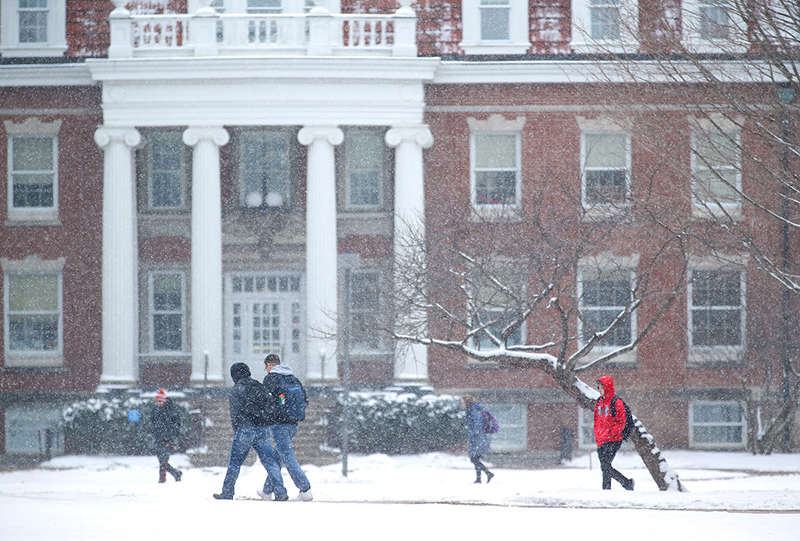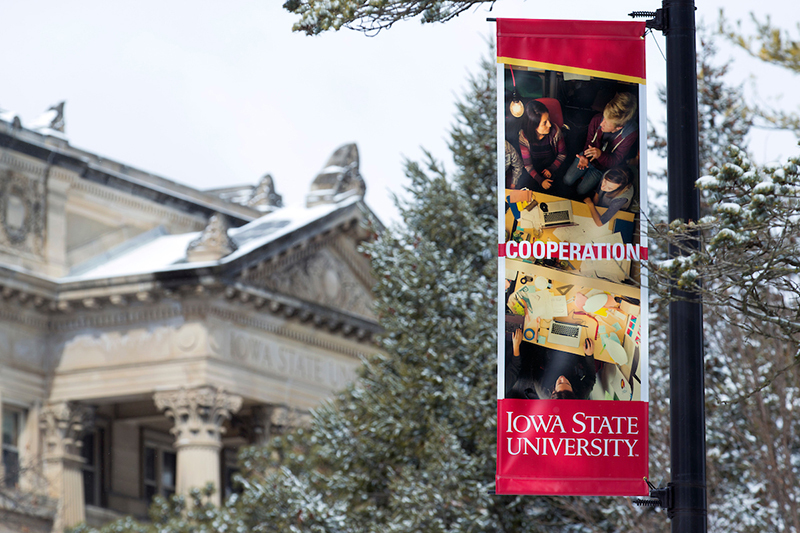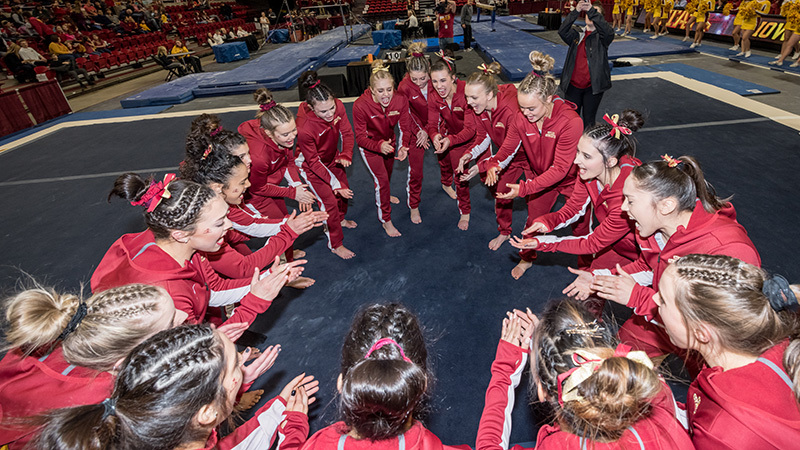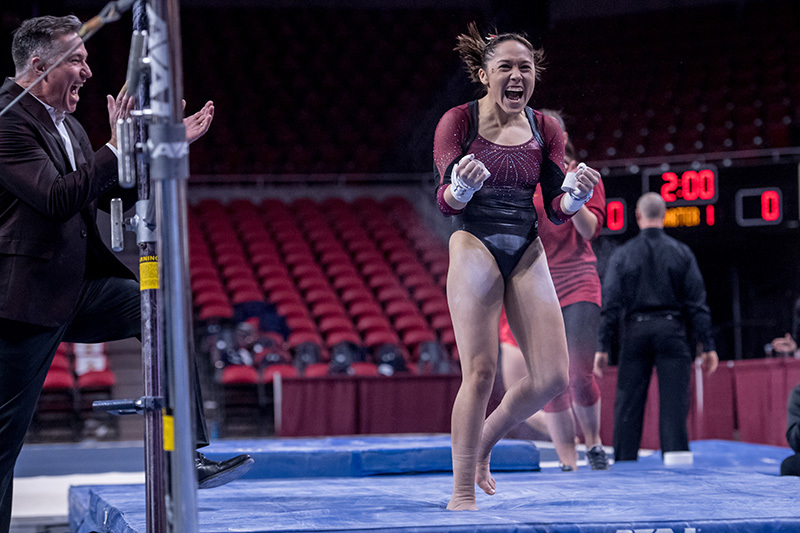Just messing with us

Photo by Christopher Gannon.
As the university community anticipated a spring break from busy schedules, Mother Nature sent a reminder Tuesday that spring typically arrives in fits and starts. A sure sign of spring -- the return of daylight saving time -- will be here early Sunday morning (March 11). Remember to set your clocks ahead an hour this weekend.
Workday go-live date moved to 2019
In January, President Wendy Wintersteen asked the WorkCyte project team to revisit the implementation schedule for the Workday software system, originally targeted to start in the latter half of 2018. This week, she approved a recommendation to roll out Workday's human capital management, payroll and financial platforms on July 1, 2019. A schedule for Workday's student information platform still is in the works.
"There was very thorough research done with multiple groups on campus and everyone came to the same recommendation for this new go-live date," said Kristen Constant, interim vice president and chief information officer. "It really did come down to making sure we could deliver a quality product in a timely manner, while taking into consideration the well-being of the people working so hard on this project."
Constant said many of the people on the WorkCyte team are doing their regular jobs in addition to the extra demands of Workday configuration and implementation.
Best option
Learn more about WorkCyte
The recommendation was the unanimous choice of ISU leaders and WorkCyte teams who studied six implementation timeline scenarios.
"The new schedule gives us the time we need to properly prepare and train our colleagues for the new system and processes," Constant said. "Everyone will be impacted by the implementation."
What's ahead
The Workday system is being configured to meet Iowa State's needs for its financial, human capital and payroll processes. Functional testing is happening right now and will continue into early summer, followed by comprehensive testing with other on- and off-campus systems.
"The new go-live date allows us to thoroughly test all aspects of the Workday platform and ensure an implementation of the highest quality," Constant said.
Learning and training already is underway, with workshops and online resources available through WorkCyte's Ready, Set, Learn initiative. Constant emphasized that all employees need to learn the Workday basics before the hands-on training begins.
"Anyone who gets a paycheck needs to know that this coming and prepare for the changes," she said.
Spring undergraduate commencement to become two ceremonies

After two years outdoors, spring undergraduate commencement is returning to Hilton Coliseum -- and splitting into two ceremonies. File photo.
Iowa State will split its spring undergraduate commencement into two ceremonies on the same day, with graduates from three colleges recognized at each.
President Wendy Wintersteen announced the change March 1 following several months of study by a task force. Their work included an early fall survey of the senior class that garnered nearly 2,200 responses.
A ceremony for students in the colleges of Agriculture and Life Sciences, Business, and Liberal Arts and Sciences will begin at 10 a.m. Saturday, May 5; a ceremony for students in the colleges of Design, Engineering and Human Sciences will begin at 2:30 p.m., both in Hilton Coliseum. This college split should result in a similar number of graduates at each event.
Two smaller ceremonies is intended to provide graduating students with the elements they indicated they prize in their graduation day, such as having their names read as they walk across the stage, a seat for all their guests, a shorter event and multiple colleges sharing a ceremony so they can celebrate with friends.
The new plan applies to spring commencement only. Interim registrar Jennifer Suchan, who chaired the task force, said this option received the highest recommendation by the task force among six options it developed. It rose to the top by addressing student wishes, the guest experience, weather variables, ceremony length, adjustments to the final exam schedule and the overall Iowa State experience, she said.
For the last two years, undergraduate spring commencement was held outdoors at Jack Trice Stadium, in part to provide unlimited seating for students' families and friends. But record-high graduating classes on the heels of a 40 percent enrollment surge made for a lengthy ceremony -- nearly four hours last May.
"We knew that was not a sustainable model. We decided last May something would have to change," Suchan said. "We're excited about this plan."
Commencement stage officials
The Iowa State representatives who process in and sit on the stage also will be split among the two undergraduate ceremonies, as will student marshals. Several university officials -- the president, senior vice president and provost, and senior vice president for student affairs -- will attend both. Wintersteen will speak at both events and her remarks will replace a guest speaker -- in most cases. However, the president will have the flexibility to invite a speaker(s) to spring undergraduate commencement.
Impact to college events
The addition of a Saturday morning commencement ceremony in Hilton puts four college convocations there on Friday at three-hour intervals (10 a.m.-7 p.m.). This includes the colleges of Agriculture and Life Sciences, Business, Human Sciences, and Liberal Arts and Sciences. On Saturday morning, the College of Design will use Stephens Auditorium for its convocation. The College of Engineering, which prefers to recognize its students at department-level receptions, will continue this tradition at locations across campus and at Ames' two secondary schools.
Suchan said seniors wanted the option to wear their academic robes at their college convocation, which wasn't allowed the last two years. As a result, college deans will set the attire rules for their own events.
Suchan said this flexibility may impact attendance at the university ceremonies, but she doesn't anticipate a significant drop in student participation.
Compact exam schedule
With the new schedule, final exams will conclude Thursday evening instead of Friday noon. The exception is the Online Testing Center, which will remain open Friday. Nine exam periods designated for specific high-enrollment courses were consolidated into seven so that the two Friday morning exam periods could be moved earlier in the week. The exam originally scheduled at 7:30 a.m. Friday will begin at 7 p.m. Tuesday; the original 9:45 a.m. Friday exam period will begin at 2:15 p.m. Tuesday. All exam periods remain two hours long.
Graduate events
The Graduate College commencement ceremony will stay in its Thursday evening slot, beginning at 7 p.m. May 3 in Hilton Coliseum. The College of Veterinary Medicine will continue to hold its ceremony for Doctor of Veterinary Medicine candidates at midday Saturday in Stephens Auditorium. The start time has been pushed back 30 minutes, to 12:30 p.m.
Related stories
December commencement will return to two ceremonies, Sept. 7, 2017
Graduation weekend changes intended to improve everyone's experience, Jan. 21, 2016
The kitty poster rule and other free speech reminders
University counsel Michael Norton knows defending the First Amendment on a college campus is difficult. It's difficult everywhere, because conflicts over free speech protections usually concern controversial or even vile views. Consensus opinions spark few arguments.
"I know in my heart that the First Amendment is a fundamental principle upon which our government and our society is based. But also, I see on a daily basis the impact of the First Amendment on individuals on campus," Norton said in a recent faculty development workshop on free speech and academic freedom. "That's a tough position to be in a lot of times."

Michael Norton
Despite the discomfort, Norton said university officials should resist the temptation to "begrudgingly" defend free speech rights as merely following the law.
"We ought to willingly accept and champion the fact that we are a campus that adheres to and believes in, as one of its founding principles, the preservation and advancement of the First Amendment. It's critical. It's important to higher education," he said.
In the Feb. 23 workshop, "The Public Classroom," Norton outlined how speech protections come into play on campus. Here are some of the basics from his presentation:
You're the government
At a public university such as Iowa State, faculty and staff are agents of the government. Actions ISU workers take to limit or punish expression are government restrictions on speech. The First Amendment bars the government from restricting most speech, though some rules can be established. Those rules can't consider the content of the message.
The university -- i.e., the government, you -- can set reasonable restrictions to limit the time, place and manner of speech. The rules must be consistently applied, regardless of the views expressed. What's reasonable? Consider how most people would regard the rule if they read about it on the front page of the Des Moines Register, Norton said.
Narrow exceptions
There are a handful of exceptions to the broad constitutional protection of viewpoints, but they all are narrow. For instance, speech inciting imminent law-breaking or violence can be regulated. But courts have rejected arguments that racial slurs and cross-burning are fighting words, Norton said. True threats aren't protected speech, but they must be believable, specific and targeted.
Harassment isn't protected, but it must be severe and pervasive conduct creating a hostile environment that substantially interferes with the target's employment or education. A single incident alone typically wouldn't amount to harassment, Norton said. "It's a tough area," he said. "Typically, restricting speech is not how we do it. We address impact."
No kitty posters
Norton often has to disappoint students who expect the university to be able to regulate hateful speech. "Hate speech is protected speech," Norton said.
Multiple times in recent months, the university has taken down racist posters on campus. It could do so because the posters were placed in locations where posters aren't allowed under the university's facilities use policy. Norton said signs with offensive messages must be treated the same as signs with inoffensive messages, such as advertising a cat for sale.
"If you've been taking down the kitty poster, then you can take down the white supremacy poster," he said.
Don't take down concerning signs yourself. Call facilities planning and management, 294-5100.
In the classroom
For more on disruptions
A faculty development workshop on handling classroom disruptions will be held March 20 (2-4 p.m., Memorial Union Cardinal Room). Register online at Learn@ISU.
An instructor can set speech-restricting classroom rules to prevent disruptions as long as they're reasonable, content-neutral and uniformly enforced. Consistency is key.
"They tend to only be applied when you also have a problem with the content of the speech," Norton said.
Talking about your political beliefs is fine, as long as you allow students who don't agree with you to speak and don't grade them lower for their views. While the university's academic freedom policy, found in the Faculty Handbook, offers wide latitude in teaching, discussing, researching and other academic pursuits, it does not protect inappropriate classroom conduct that's not germane to the subject at hand.
"The institution can have rules about how you teach and what you teach," Norton said.
Off-hours rights
Though Iowa State is a governmental body, it also is an employer. Public employees' First Amendment rights can be limited in the course of their official duties. Workers can be disciplined for what they say or do.
Outside of that context, university employees are afforded the same constitutional free speech rights as anyone else as long as you're speaking as a private citizen about a matter of public concern. That's true even if your opinion runs contrary to the university's institutional views, Norton said. Public discussion about private matters related to your official duties isn't protected speech, however.
Look up

One of the Principles of Community banners on Morrill Road this month. Photo by Christopher Gannon.
In conjunction with the ISCORE conference March 2, banners went up along Morrill Road reminding Iowa Staters of their principles of community. The six principles -- respect, purpose, cooperation, richness of diversity, freedom from discrimination, and honest and respectful expression of ideas -- were created by Student Government and endorsed by former President Gregory Geoffroy in 2007, and revived by former President Steven Leath in the fall of 2016.
Designed by a student team at Model Farm, the banners are the project of six members of this year's Emerging Leaders Academy sponsored by the office of the senior vice president and provost. All eight colleges helped pay for the banners, as did the offices of the senior vice president for student affairs and vice president for diversity and inclusion.
They'll remain in place through the first week of April.
How ISU's ombuds officer can and can't help
Wonder if you're striking the right tone in a sensitive email? Need a go-between to help facilitate a tough conversation? Distraught at work and trying to figure out your options?
Those are the types of issues Iowa State ombuds officer Deanna Clingan-Fischer helps employees address, she told the Professional and Scientific Council at its March 1 meeting.
As the university's ombuds officer, Clingan-Fischer is a confidential, impartial and informal resource for faculty, staff, post-docs and graduate/professional students facing challenges at work or school. The position was created in 2008 but newly expanded to full time last summer, after it was opened to merit staff. Clingan-Fischer stepped into the position in August 2017.
"People can come to me with their concerns, with their issues, with their problems, and we can talk through them," she said.
Clingan-Fischer likens herself to a sounding board. She listens, provides feedback, helps identify issues, points to policies and makes referrals, but she won't tell people what to do or serve as an advocate or investigator. Her role is to provide nonjudgmental, neutral information -- including some services, such as communication coaching and assistance with discussions.
In FY17, the ombuds office saw 94 people -- including 38 P&S staff and 27 faculty members. The record caseload for the office was in FY15, when it met with 153 people. Through February, Clingan-Fischer said she had met with 48 P&S employees in FY18. She's working on ways to better reflect ombuds activity in future annual reports, she told council members, noting she has met 18 times with one individual.
The top issues Clingan-Fischer hears about are lack of respect and communication breakdowns. Conflicts with supervisors typically have been the most-cited concern, according to the office's annual reports.
Though information shared with Clingan-Fischer is private, she does have a duty to report situations where an individual is unsafe. She also shares trends with university administration if they appear to indicate systemic issues.
"If I have five people coming to me saying the same thing, I know," she said.
Officer elections
The council also elected its executive officers for 2018-19. Members will begin serving in these roles July 1, when president-elect Stacy Renfro takes the reins from current president Jessica Bell:
- President-elect, Amy Ward, program coordinator at Center for Excellence in Learning and Teaching
- Vice president for university planning and budget, Barry McCroskey, accountant for ISU Extension and Outreach
- Vice president for university community relations, Kelly Friesleben, associate director of transfer admissions
- Vice president for equity and inclusion, Carolyn Duven, program coordinator for the Academic Success Center
- Secretary/treasurer, Joy Stroud, administrative specialist at Reiman Gardens
Council member elections will be held March 19-30, with voting online via AccessPlus. P&S employees will receive an email reminder about the election.
Cy-Hawk matchup

Photos courtesy of athletics communications.
The No. 25 Iowa State gymnastics team will face Iowa and No. 19 Missouri in a triangular meet Friday, March 9, in Hilton Coliseum (6:30 p.m.). It is the Cyclones' regular-season home finale before returning to Hilton March 24 as host of the Big 12 Conference Championships. Tickets for either event are $5. Iowa owns a 13-8 advantage in the Iowa Corn Cy-Hawk Series, with six points -- two each awarded for gymnastics, softball (April 25) and academic performance -- remaining in the 2017-18 standings.

